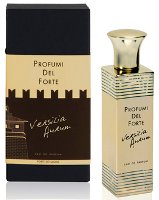
Italian niche line Profumi del Forte has added two more fragrances to their Versilia range (see the debut scents, Boisé and Ambra Mediterranea). Versilia Aurum and Versilia Platinum are limited edition fragrances.
Versilia Aurum (shown) ~ "The first impression is that of a colorful basket of fruit: a joyful spray of orange, strawberry, plum. But the heart is an infusion of flowers, with the warm notes of heliotrope, the sweetness of jasmine and the emotions of rose that lead to a light vanilla base, touched by the balsamic reflex of tolù balsam and the precious sensuality of grey amber." Additional notes include tuberose, lily of the valley, ylang ylang, iris, orchid, tonka bean, Peru balsam, sandalwood and white musk.
Versilia Platinum~ "Unique and uniquely precious. Fire of eternal opposites: sun and noon, day and night, gold and silver. The scent starts fresh and spicy with citrus notes, becoming rich in floral aromas – geranium, freesia, rose, Lilly- of- the- valley [sic] …..and finally it becomes warm and intense, recalling the woody tones of cedar, the dry notes of vetiver and the exotic tones of incense and patchouly. A strong but yet enigmatic fragrance." Additional notes include bergamot, grapefruit, pink and black pepper, rhubarb, mirth [myrrh? myrtle?], magnolia, vanilla, immortelle and oak moss.
Profumi del Forte Versilia Aurum and Versilia Platinum are available in 100 ml Eau de Parfum. (via intertradeurope)
Well, I could use a dash of mirth in my scents. There’s never enough of that stuff in my life.
(Just now occurred to me that “mirth” and “merry” probably share a root word.)
And never enough in perfume.
Thanks, mals86: well spotted! I’ve just found a good etymological summary here: http://www.word-origins.com/definition/merry.html
^_^
Never let it be said that perfumistas are not an erudite bunch. 😉
Well done, thanks!
These ad copies sometimes remind me of those “bloopers” collected by frequent travelers from places where English is kind of, sort of, more or less spoken (but, to be fair, spoken far better than we English speakers tend to speak other languages!)
I think they probably meant “sun and moon” as eternal opposites, not “sun and noon”!